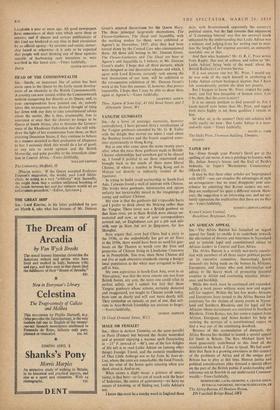YANGTSE GUNBOATS
SIR,—As a lover of nostalgic memories, however contradictory, I have perused Strix's recollections of the Yangtse gunboats amended by Mr. G. R. Fuller with the delight that moved me when I read about the Bombay bowlers and the braces acquired some- time mysteriously in Hong Kong.
But as one who came upon the scene twenty years after, when the mess those gunboats made in British- Chinese relationships had somehow got to be cleared up, I found it painful to see them resurrected and brought back to the minds of these more liberal Chinese, of whom a number in Hong Kong and in Malaya are directly or indirectly readers of the Spectator. '
In trying to build racial partnership in South-East Asia, I always found a wall of mistrust with Chinese. The bricks were gunboats, missionaries and opium unfairly but inextricably mixed in the imaginings of young and militant Chinese.
My view is that the gunboats did irreparable harm and I prefer to think about the Mekong rather than the Yangtse. There never was a British gunboat on that Siam river, yet in Siam British were always un- molested and now, as one of your correspondents pointed out, an Englishman. can get a job and wife with caw in Siam ,but not in Singapore, far less Shanghai.
Strix argues that, even had China had a navy in the 1930s, as she undoubtedly has got an air force in the 1950s, there would have been no need for gun- boats on the Thames to watch over the lives and properties of Chinese living in Limehouse Causeway or in Pennyfields. Too true, since those Chinese did not live at such obtrusive standards among a hungry local population as the white man arrogated to him- self in Asia.
My own experience in South-East Asia, even in an 'Emergency,' was that the more remote one was from British forces, any arm, the more one could relax in perfect safety, and I cannot but feel that those Yangtse gunboats whose actions, certainly distorted and exaggerated, are taught to Chinese youth today, have cost us dearly and will cost more dearly still. They symbolise an episode, or part of one, that acti- vists in Asio-British friendship are anxious to forget. --Yours faithfully,


































 Previous page
Previous page